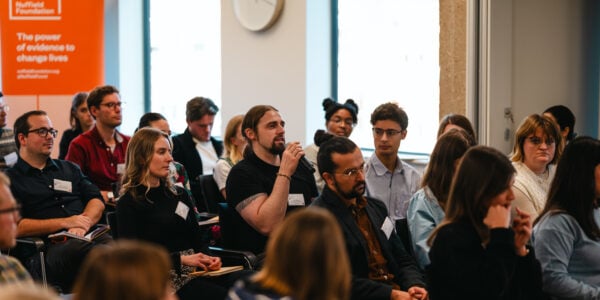Nuffield Foundation and Versus Arthritis invest in five new projects
More than 20 million people across the UK live with a musculoskeletal (MSK) condition and face daily challenges that affect their mobility, independence, and quality of life. These challenges also have broader consequences for the wider economy, influencing workforce participation and reducing the country’s overall productivity.
The Nuffield Foundation’s Oliver Bird Fund and Versus Arthritis are investing £2.4 million in five new research projects aimed at developing policies and solutions to improve the lives of those affected, and contribute to improving economic inactivity by helping more people with MSK conditions join, stay in, or return to employment.
The new grants are awarded to universities across the UK, and projects span a range of topics, including:
- The impact of MSK conditions on job retention and quality
- The issues young people face in managing chronic MSK pain
- How arthritis affects farmers’ health and work
The Nuffield Foundation and Versus Arthritis partnership
The new grants are the third round of awards from the Oliver Bird Fund, which is dedicated to improving the lives of people with MSK conditions, and our partnership with Versus Arthritis. The £2.4m funding commitment will be shared equally between the two organisations.
We’re delighted to be funding a package of five high-quality research grants. Each project focuses on a different aspect of living with an MSK condition and recognises that these challenges affect people of all ages, backgrounds, and professions. We know that MSK conditions are one of the main barriers to people being economically active. By investing in a diverse range of research, we aim to drive meaningful change in how people can work – and live better – with MSK conditions, and generate evidence-based recommendations to support them through more effective services, workplace practices, and policy.Dr Catherine Dennison, Programme Head, Oliver Bird Fund
We are proud to be partnering with the Nuffield Foundation for a third time through the Oliver Bird Fund to support five outstanding new research projects. These projects will generate vital evidence to help us better understand the wider impacts of arthritis in both adults and children, and identify more effective, holistic approaches to care and support. This work will ultimately help shape policies and services that improve the everyday lives of people living with musculoskeletal conditions, ensuring they have the support they need to live well.Professor Lucy Donaldson, Director of Research at Versus Arthritis
About the newly funded projects
Economic inactivity, arthritis & depression: who, why and how to respond
Led by Professor Max Henderson (University of Leeds, £683,909)
Reducing economic inactivity (EI) is a top priority for the Government to boost the economy and reduce inequality. More than 20 per cent of economically inactive people have MSK conditions, and over half also experience mental health issues but little is known about who has both conditions and how having both is related to EI. Using national survey data from approximately 100,000 people and interviews, the team will examine how having an MSK and a mental health condition contributes to the risk of becoming economically inactive. The research will develop guidance to help people stay employed or return to work.
Musculoskeletal conditions, employment retention and job quality
Led by Professor Melanie Jones (Cardiff University, £236,213)
DWP reports that disabled workers are twice as likely to leave employment as non-disabled workers, but there’s a lack of data on how this varies by health condition. This research will examine how different types of MSK conditions affect disabled workers’ ability to stay in employment, focusing on job quality and employment retention. It will investigate variation across condition type, severity, and co-existing health issues, including mental health. Using data from the Annual Population Survey and Labour Force Survey, the study will model employment patterns, transitions, and outcomes for people with MSK conditions. A co-production approach will deliver policy recommendations in partnership with Scope and the Business Disability Forum.
Arthritis and Farmers in England: Impacts, Adaptations and Prevention
Led by Professor Nicholas Evans (University of Worcester, £267,815)
Although arthritis is likely common among farmers, there has been no UK research into its impact. This study will investigate how the condition affects farmers’ health and work, identifying how they adapt and cope. It will explore cultural and occupational influences that discourage farmers from prioritising their health. The findings aim to promote arthritis as a manageable and preventable condition in rural working communities. The project will include a global evidence review and observational work with farmers in Herefordshire and Worcestershire. Researchers will co-develop fact sheets, and health professionals will deliver interventions. Outputs will include policy recommendations, multimedia materials, and outreach through farming networks.
Musculoskeletal conditions in underserved communities
Led by Professor Ross Wilkie (Keele University, £699,914)
This project focuses on addressing the lack of research and healthcare planning for underserved communities with MSK pain. These include people in deprived areas and from ethnically diverse backgrounds who experience higher levels of pain but are underrepresented in existing research. The goal is to understand and reduce health inequalities in MSK conditions. The research involves surveys, interviews, and data analysis linking health records and social determinants. Community researchers will be central to the process, with a strong focus on co-production. The team will work closely with policymakers, healthcare providers, and community organisations to turn findings into actionable interventions.
Challenges young people face in managing musculoskeletal chronic pain
Led by Dr Line Caes (University of Stirling, £499,495)
This study will investigate how young people aged 12–24 manage chronic MSK pain, exploring the role of executive functioning (EF) – the ability to regulate thoughts, behaviours, and emotions – in successful self-management. It aims to develop a tool for assessing young people’s ability to manage their condition and identify support needs. The project involves interviews, workshops, and quantitative analysis data from the Avon Longitudinal Study of Parents and Children. New data will be collected from 150 young people in Scotland, particularly those from deprived backgrounds. Findings will inform clinical practice, future interventions, and policy to improve outcomes for young people living with MSK pain.













